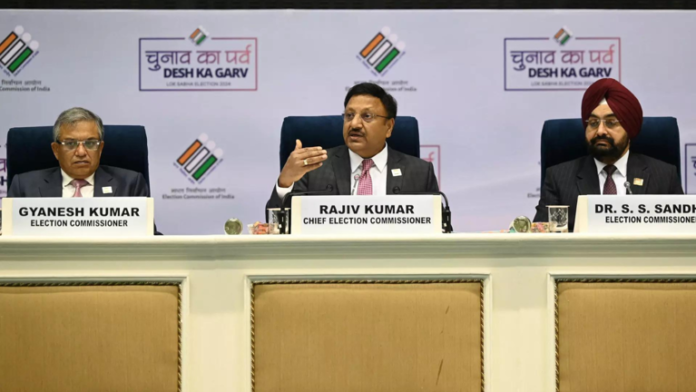In a surprising turn of events, the Election Commission (EC) has announced a modification in the counting date for the Arunachal Pradesh and Sikkim Assembly polls, rescheduling it to June 2. This decision, which deviates from the initial counting schedule, has drawn attention and stirred speculation about the underlying reasons and implications for the electoral process in these northeastern states.
Arunachal Pradesh and Sikkim, nestled amidst the picturesque landscapes of the Eastern Himalayas, have been gearing up for the Assembly elections, which concluded recently amid fervent campaigning and voter turnout. However, the sudden alteration in the counting date has introduced an element of uncertainty and intrigue into the electoral landscape.
The decision to change the counting date for the Assembly polls in Arunachal Pradesh and Sikkim comes amidst logistical and administrative considerations, as well as the need to ensure the smooth conduct of the electoral process. According to the Election Commission, the rescheduling was necessitated by the time required for the transportation of electronic voting machines (EVMs) and other poll-related materials from remote and inaccessible areas to the counting centers.
Arunachal Pradesh and Sikkim, with their challenging terrain and dispersed population centers, present formidable logistical challenges for election authorities. The EC’s decision to extend the counting period provides additional time for the retrieval and transportation of EVMs from far-flung polling stations, ensuring that the integrity and accuracy of the electoral process are maintained.
Moreover, the rescheduling of the counting date reflects the Election Commission’s commitment to upholding the principles of transparency, fairness, and accuracy in the conduct of elections. By allowing sufficient time for the meticulous tabulation and verification of votes cast, the EC seeks to instill public confidence in the electoral process and ensure the credibility of the election results.
The alteration in the counting date also serves as a testament to the EC’s responsiveness and adaptability in addressing unforeseen challenges and contingencies that may arise during the electoral process. It underscores the Commission’s commitment to ensuring that elections are conducted in a free, fair, and impartial manner, in accordance with established norms and guidelines.
Furthermore, the rescheduling of the counting date for the Arunachal Pradesh and Sikkim Assembly polls underscores the importance of effective coordination and collaboration among various stakeholders involved in the electoral process. From election officials and security personnel to political parties and civil society organizations, the successful conduct of elections relies on the concerted efforts of all stakeholders working in tandem to uphold the democratic ideals and values.
While the alteration in the counting date may disrupt the initial timeline and expectations surrounding the electoral process, it is imperative to recognize the underlying rationale and necessity behind the decision. The EC’s primary objective is to ensure that the electoral process is conducted with integrity, transparency, and efficiency, thereby upholding the sanctity of the democratic process and the will of the people.
As Arunachal Pradesh and Sikkim await the final verdict of the electorate, the rescheduling of the counting date adds an element of suspense and anticipation to the electoral narrative. It underscores the significance of every vote cast and the pivotal role that citizens play in shaping the future direction of their states through the democratic process.
In addition, the Election Commission’s decision to change the counting date for the Arunachal Pradesh and Sikkim Assembly polls to June 2 reflects a strategic and pragmatic approach to addressing logistical challenges and ensuring the integrity of the electoral process. While the alteration may lead to temporary disruptions, it ultimately reinforces the Commission’s commitment to upholding the democratic principles and values that form the cornerstone of India’s electoral democracy. As the electoral process unfolds, citizens remain vigilant and engaged, reaffirming their faith in the democratic ideals and institutions that underpin the nation’s governance.


